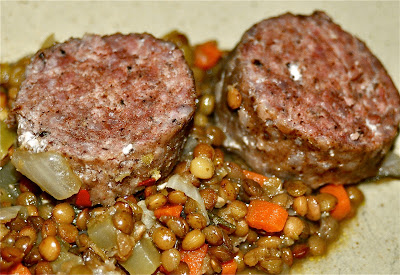How to make cotechino sausage
This is my friend Scott. He likes a good sausage. So does his partner Giovani.
Lucky for me, the two men are particularly fond of cotechino, a highly seasoned Italian variety most often served with lentils to celebrate the New Year. Since I had decided to manufacture my very own cotechino this past holiday, it was easy to put the arm on my very tasteful buds so as to secure at least one additional set of hands to complete the task.
The guy in the picture is the one whose helping hands were offered to me. The other one? He fled to the nearest hot yoga studio for nearly the entire morning that we were scheduled to work (though he did at least have the decency to treat us to a lovely lunch).
Men!
This, by the way, is your traditional presentation of cotechino. It is exactly what I served for New Year's day brunch last week and, according to Italian lore, should bring good luck to me and my guests through the coming year. Finding cotechino is not so easy in the United States, regardless of where you live, and so ask your local Italian specialty store about getting some in or search for it online.
You didn't really think that we'd made enough for everybody, did you?
This is the mixture of ground meat (6 pounds of it) and spices that we used. Cotechino is very different from other sausages; the meat mixture is about 40 percent pork, 30 percent pork fat, and 30 percent pork skin. The skin is very difficult to grind using non-commercial equipment and so Jarrod, butcher par excellence at Rosemont Market here in town, offered to custom grind a mix for us. The seasonings we then used are traditional, if haphazardly measured: 3 minced garlic cloves, 4 tablespoons kosher salt, 3 tablespoons cracked black pepper, 2 teaspoons nutmeg, 2 teaspoons cinnamon, 3 teaspoons cayenne, 2 teaspoons clove, and a scant quarter-teaspoon of pink salt for curing.
Scott was rather insistent that he work with the meat mixture, I don't know why, and it being his place where the sausage-manufactuting commenced I chose not to argue this point.
These being large sausage, roughly a pound each, we opted to make one at a time rather than attempt to link them all together. For a more traditional link sausage-making primer go to this link.
Using pink salt in the mix meant that we could allow the finished sausage to hang in a cool place and cure for 24 hours. My friends' basement was in the 55- to 60-degree range and so that's where the curing took place. With only two cotechino needed for New Year's (one for my friends, another for my guests and I) we froze the other four. (Yes, Fred, you may have one of them. But you'll need to get in the car and drive north.)
Fresh cotechino that has curing salt should soak in cool water before cooking; this helps to remove the salt. New Year's Day brunch was scheduled for around oneish and so I started soaking our sausage around 7 a.m., occasionally changing the water.
Cotechino is boiled at low- to moderate heat, and for varying degres of time, depending on the product you have. This one would take around 90 minutes, Jarrod the Wonder Butcher reasoned, and so at around 11 a.m. the sausage went into a pot of plain water.
At around noon I got the lentil prep going. First I sauteed 2 garlic cloves, 2 finely diced carrots, a celery stalk, a large onion and a hot pepper in olive oil until softened.
Then came a quart of chicken stock, a bay leaf and lentils. (The night before I'd soaked 1 1/4 cups of Italian lentils, which turned into 4 cups after soaking overnight. Of that I used three cups in this recipe.)
When the sausage and lentils were pretty much done I added the cotechino to the pan so that everything could simmer together at low heat for around 15 minutes.
Some people pierce the sausage casing during cooking, but I don't. That means there is liquified fat inside the cooked sausage, which you can either add to the lentils or discard, which is what I did.
All that's left to do now is remove the sausage from the casing, slice, and arrange over the lentils in a serving dish.
If this doesn't bring you good luck I really do not know what will.
Source: mistermeatball.blogspot.co.uk/















